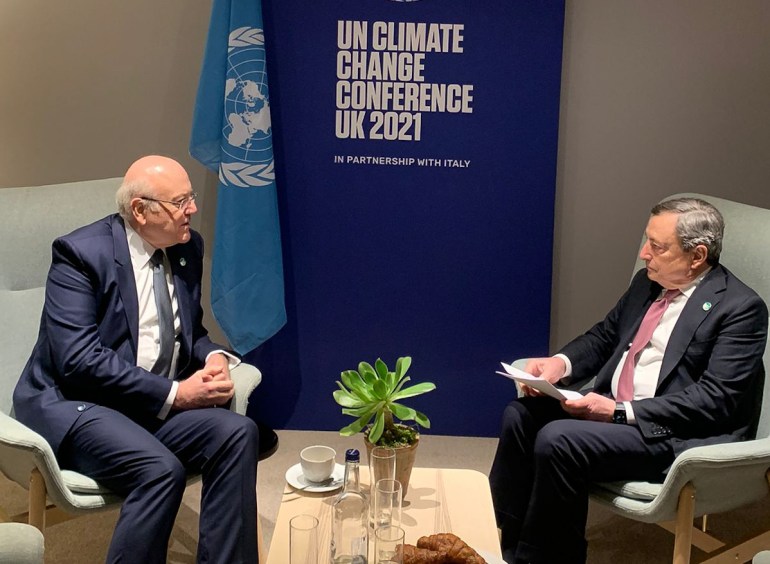Yemen summoned its ambassador in Lebanon for consultations against the background of the statements of the Lebanese Minister of Information, George Kordahi regarding the role of the Saudi-led coalition in Yemen, while Bahrain asked its citizens to leave Lebanon immediately. On the other hand, Lebanese President Michel Aoun said that efforts to resolve the dispute with Saudi Arabia and the Gulf states are continuing on several levels.
The Yemeni Ministry of Foreign Affairs said in a statement that it had summoned the Yemeni ambassador to Lebanon, Abdullah Al-Deais, "to consult about the reprehensible statements of the Lebanese Minister of Information." The Yemeni Foreign Ministry described it as "a deviation from the Arab position in support of the just Yemeni cause in the face of a coup militia."
Bahrain today also asked its nationals to leave Lebanon immediately due to the tense situation in it, days after Manama withdrew its ambassador from Beirut against the background of the crisis related to the statements of the Lebanese Minister of Information, and the Bahraini Ministry of Foreign Affairs said in a statement that it confirms its previous statements not to travel permanently to Lebanon. This is to prevent citizens from being exposed to any risks and to ensure their safety.
The Bahraini decision comes after a similar decision announced by the UAE the day before yesterday, Sunday, in which it called on its nationals to leave Lebanon as soon as possible.
The government summons its ambassador to Beirut to consult on the statements of the Lebanese Minister of Information https://t.co/hMt2acqUyh #Yemen
— Ministry of Foreign Affairs of the Republic of Yemen (@yemen_mofa) November 2, 2021
In the past days, Saudi Arabia, the Emirates, Bahrain and Kuwait announced the withdrawal of their ambassadors from Beirut, and Riyadh banned all Lebanese imports, in protest against Qardahi’s statements about the war that has been going on in Yemen for nearly seven years. A futile war.
Aoun's statements
On the other hand, Lebanese President Michel Aoun said, during his meeting with the head of the European Parliament delegation for relations with the Middle East, Isabel Santos, that efforts are continuing to resolve the dispute with Saudi Arabia and a number of Gulf countries.
During his meeting with Santos, Aoun stated that the parliamentary elections will be held on time (next March 27), and that the government is continuing to prepare for negotiations with the International Monetary Fund to help solve Lebanon's economic crises.
Lebanese Foreign Minister Abdullah Bou Habib said today that Saudi Arabia is dictating impossible conditions by asking the government to limit the role of Hezbollah, adding in a statement to Reuters that the Saudis did not have any contacts with the newly formed government even before the recent diplomatic dispute related to Qardahi's statements.
Bou Habib added that he believes that dialogue between Lebanon and Saudi Arabia is the only way forward to resolve the dispute, but added that there have been no meetings at any level between the two parties since the formation of Prime Minister Najib Mikati's government more than a month ago.
Regional links
The Lebanese Minister of Culture, Muhammad Wissam Al-Mortada, stated today that there are serious data indicating that the crisis with Saudi Arabia is a reaction to what he described as developments in the region, which have major strategic repercussions.
In a press interview, Mortada added that the Lebanese state did not issue any hostile stance towards the Kingdom and the Gulf states, pointing out that "the stumble of regional negotiations has created a theory that points to seeking to fabricate a major crisis in Lebanon, as a prelude to negotiation on its basis, and to barter between it and a crisis elsewhere." .
And the Lebanese Minister of Environment, Nasser Yassin, said yesterday in an Al-Jazeera bulletin that putting forward the resignation of Minister of Information Qardahi is one of the options, and it will be discussed during the next two days, and the Lebanese Prime Minister said yesterday that the Emir of Qatar, Sheikh Tamim bin Hamad Al Thani, will send the Qatari Foreign Minister to Beirut to search for Ways to solve the Lebanese Gulf crisis.
Western support
On the other hand, Al-Jazeera correspondent in Beirut quoted sources familiar with the developments of the Lebanese-Saudi crisis that Prime Minister Mikati received French and American support, during his meetings yesterday on the sidelines of the climate conference held in the Scottish city of Glasgow, north of Britain.
According to the sources, Western officials stressed to Mikati the necessity of continuing his duties at the head of the government, and not submitting his resignation.
Mikati (left) met yesterday on the sidelines of the Climate Conference with Western officials to mobilize support for his government's plan to solve the Lebanon crisis (Anatolia)
The Lebanese Prime Minister also received promises from Western officials that they would contribute to finding ways out of the crisis in the Lebanese-Gulf relations.
Mikati met with US Secretary of State Anthony Blinken on the sidelines of the climate conference. During the meeting, the Lebanese official presented his government's approach to achieving political, economic and social stability in Lebanon, calling on Blinken to support the United States to launch the economic recovery plan, and start communication with the International Monetary Fund.
The US Secretary of State described his meeting with Mikati as fruitful, adding in a tweet on Twitter that they discussed the urgent need to implement the necessary reforms to address Lebanon's economic crisis, as well as organizing free and fair elections next year.
For two years, Lebanon has been suffering from an unprecedented political and economic crisis that led to a record collapse in the value of the local currency against the dollar, as well as a shortage of fuel and medicine, and the collapse of purchasing power.

